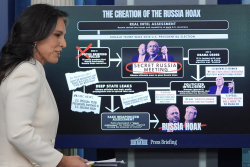Some argue that President Trump’s executive orders on nuclear power will usher in a nuclear renaissance but others are more skeptical about their effects.
Over the past several presidential administrations, the executive branch, rather than Congress, has been driving more and more of the debate on the adoption of renewable energy and an end to fossil fuel consumption — whether it has taken the form of President Barack Obama’s Executive Order 13514, President Joe Biden’s proposal of the “Build Back Better” bill, or President Trump’s recent executive orders regarding nuclear energy. In an age of hyper-partisanship, all of these executive orders faced criticism from their political opponents for one reason or another, and President Trump’s executive orders are no exception.
Even so, as the need for a reliable and clean source of energy becomes ever more important, the question is: Are the executive orders the key to a nuclear renaissance or wishful thoughts that are doomed to failure?
To Read the Pro Side of This Debate, Go Here.
The pro-nuclear executive orders party states that the executive orders will usher in a nuclear renaissance, mainly by overhauling the Nuclear Regulatory Commission (NRC). Long the subject of criticisms for being cumbersome and taking forever to grant nuclear energy licenses, the executive orders aim to cap exorbitant fees and mandate licensing decisions within eighteen months. The executive orders also establish a plan for processing nuclear waste into new fuel for reactors, reducing America’s dependency on foreign uranium, and aim to bolster national security by designating nuclear-powered AI data centers and military bases as critical infrastructure. Now, if only those anti-nuclear advocates would get out of the way…
To Read the Con Side of This Debate, Go Here.
The dissent does not dispute some good aspects of the executive orders. Indeed, when taken together, they are critical for ensuring a strong civil nuclear export program to developing countries. However, not everything about them is prudent. For instance, the overhaul of the NRC threatens to place a formerly non-partisan federal agency under the control of the Department of Government Efficiency (DOGE), jeopardizing the thoroughness of licensing reviews. Further complicating matters is that these reviews will have to take place in the context of the reductions in force that the administration is mandating. How the administration will reconcile these two demands when carrying out these executive orders remains to be seen.
Image: Shutterstock/John_T


















